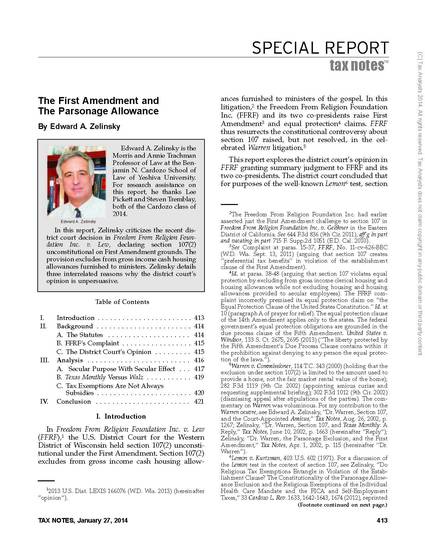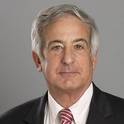
Article
The First Amendment and the Parsonage Allowance
Tax Notes
(2014)
Abstract
In this article, Professor Zelinsky criticizes the recent decision of the U.S. District Court for the Western District of Wisconsin in Freedom from Religion Foundation, Inc. v. Lew. In that decision, the District Court held § 107(2) of the Internal Revenue Code (Code) unconstitutional under the First Amendment. Code § 107(2) excludes from gross income cash housing allowances furnished to "minister[s] of the gospel."
For three, interrelated reasons, Professor Zelinsky finds the District Court’s opinion in FFRF is unpersuasive. First, § 107 has secular purpose and secular effect. Section 107 manages the entanglement which is inevitable when the modern government decides whether or not to tax the modern church. Moreover, § 107 accommodates the autonomy of religious institutions and actors by declining to tax clerical housing and housing allowances. Section 107 should be understood, not as subsidizing the church, but as separating the church from the state. The economic benefit of tax exemption is a by-product of that separation.
Second, the District Court’s FFRF opinion places too much weight on the Supreme Court’s plurality opinion in Texas Monthly, Inc. v. Bullock while giving short shrift to the Supreme Court’s earlier opinion in Walz v. Tax Commission. A more careful reading of Texas Monthly and Walz indicates that, consistent with the First Amendment, Congress can exempt from taxation churches and religious actors to avoid church-state entanglement and to accommodate the autonomy of religious institutions and actors. That is what § 107 does. Texas Monthly is the Supreme Court’s most recent treatment of the First Amendment status of tax exemptions for religious institutions, but Walz is the more convincing treatment of that status.
Third, the District Court accepts the premise of the Texas Monthly plurality that tax exemptions are always subsidies. Often tax exemptions are subsidies, comparable to direct expenditures. However, in many settings, they are not. In constitutional terms, § 107 is more convincingly perceived, not as a subsidy, but, per Walz, as managing the inevitable entanglement caused by taxation and as accommodating the autonomy of religious institutions and actors. In a world of imperfect choices, § 107 separates rather than subsidizes. The economic benefit of § 107 is a side-effect of that separation.
Keywords
- parsonage,
- parsonage allowance,
- First Amendment,
- Walz,
- Texas Monthly,
- Freedom from Religion Foundation,
- tax subsidy
Disciplines
Publication Date
January 27, 2014
Citation Information
Edward A. Zelinsky. "The First Amendment and the Parsonage Allowance" Tax Notes Vol. 142 (2014) p. 413 Available at: http://works.bepress.com/edward-zelinsky/239/
